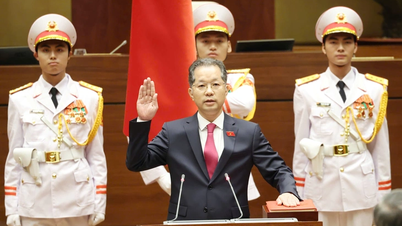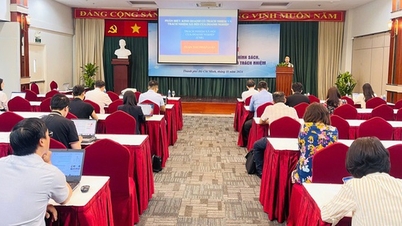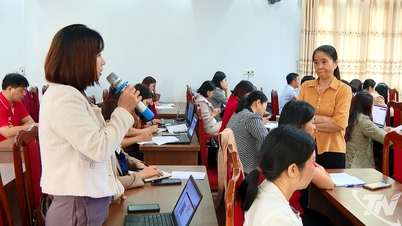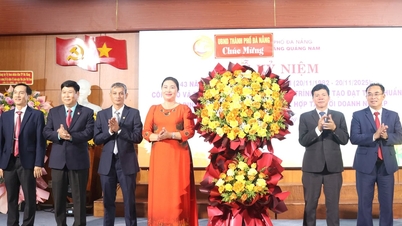
The perception gap about digital advertising
In the context of a strong and comprehensive digital transformation, e-commerce has become one of the leading economic growth drivers in Vietnam. According to the Ministry of Industry and Trade , in 2024, Vietnam's e-commerce revenue will reach more than 25 billion USD, with an average growth rate of over 20%/year. Of which, livestreaming, sales advertising and marketing through influential individuals on social networks account for more than 30% of the total transaction value.
However, along with rapid development are legal issues, professional ethics and content quality. This poses an urgent need to train and issue practice certificates for social media influencers, who are becoming the “digital consumer trendsetters” today.
Commenting on this issue, Master Trinh Thi Thu Ha, Principal of Hanoi College of Commerce and Tourism, said: Currently, Vietnam does not have a legal framework or formal training program for the profession of community influencers in the field of e-commerce. Most of these people operate spontaneously, lacking knowledge of the Law on E-commerce, the Law on Advertising, the Law on Consumer Protection and professional ethics. It is necessary to have a team of community influencers who are well-trained and have recognized practice certificates to ensure transparency and compliance with the law.
Master Trinh Thi Thu Ha also said that international trends show that many countries such as Japan, South Korea, and Singapore have issued training standards and granted practice licenses for these people. Therefore, Vietnam needs to take similar steps soon.
On the other hand, Lieutenant Colonel, Dr. Dao Trung Hieu, a criminology expert, commented: One of the root causes of the phenomenon of false advertising is the lack of information recognition skills and legal knowledge. According to a 2023 survey by the Ministry of Education and Training , only 28% of Vietnamese students have learned or heard about the skill of "verifying digital information". Meanwhile, the 18-35 age group is the largest online consumer group. Therefore, it is necessary to integrate content such as: Digital media education in schools, adding the module "identifying false advertising and fake news" in Civic Education, Life Skills, or Communication Skills... into the social education and training program. Students need to be guided on how to look up sources, check authenticity using AI tools and fact-check websites.
Next is regular training for entrepreneurs, celebrities or influential experts who are invited by businesses to cooperate in advertising; journalists and content creators. Universities of economics, law and communication need to make "advertising ethics and media law" a compulsory subject. In addition, it is necessary to educate mature consumers and strengthen community programs such as "smart consumers 4.0". Take advantage of television, podcasts, and short video platforms to convey easy-to-remember knowledge about "3 nos - 4 yeses": No blind trust - No sharing without verification - No emotional investment / Verification - Doubt - Authenticity - Reporting violations.
Professional certification for “digital consumer leaders”
In fact, promotional activities in e-commerce bring great benefits, improve communication efficiency, quickly reach customers, and build brand trust. However, in the digital environment, ensuring honesty, transparency, and legal responsibility becomes a vital issue to protect consumers and maintain brand reputation. According to Mr. Vu Tuan Cuong, AI & Digital Economy expert, Institute of Applied Science, Technology and Law (STLA), influencers in marketing need to have professional qualifications to promote and sell products in specific industries. For live broadcast programs that require high professional qualifications (such as medicine, finance, law, and education), the host must have the corresponding professional qualifications and report his/her qualifications to the live broadcast platform. When selling products such as drugs, medical devices, functional foods and medical formula foods, especially through live broadcasts, if the host is the seller, he or she must have the corresponding qualifications or administrative licenses as prescribed by law.
According to Master Nguyen Hong Bach, Director of the Institute for Applied Science, Technology and Law, it is necessary to promote propaganda, training and raise awareness for businesses, influential people in the community and influential consumers in the community. They are the ones who need to be disseminated legal knowledge about advertising and e-commerce to better identify and comply.
To effectively implement this activity, Hanoi College of Commerce and Tourism cooperated with the Institute of Applied Science, Technology and Law (STLA) and the Center for Quality Control and Counterfeit Prevention (CQSAC) to build a practical training model associated with the issuance of professional certificates for influential individuals in the community. According to Master Trinh Thi Thu Ha, the coordinating units take on the role of guiding legal standards, professional ethics standards and supervising promotional content, while Hanoi College of Commerce and Tourism is responsible for developing programs, organizing teaching, testing and evaluating and issuing professional certificates.
The program brings practical benefits to many parties, in which learners can practice legally, understand the law and professional ethics. Enterprises have more quality human resources, contributing to protecting consumers and brand reputation. State management agencies reduce violations in e-commerce, false advertising, commercial fraud, and at the same time improve management efficiency through the professional certification data system.
It can be affirmed that training and granting practice certificates to individuals and influential consumers in the field of e-commerce is an inevitable trend, not only meeting legal and professional ethics requirements, but also opening up high-quality job opportunities for the young generation. Strengthening training, standardizing capacity and granting practice certificates will form a model combining training - practice - supervision - certification, contributing to building a generation of influential people with integrity, legal knowledge, creativity and social responsibility in the digital environment.
Source: https://nhandan.vn/nang-cao-nang-luc-kiem-chung-thong-tin-so-post921749.html



























































































![Dong Nai OCOP transition: [Article 3] Linking tourism with OCOP product consumption](https://vphoto.vietnam.vn/thumb/402x226/vietnam/resource/IMAGE/2025/11/10/1762739199309_1324-2740-7_n-162543_981.jpeg)













Comment (0)